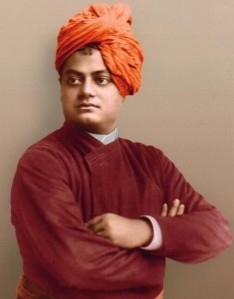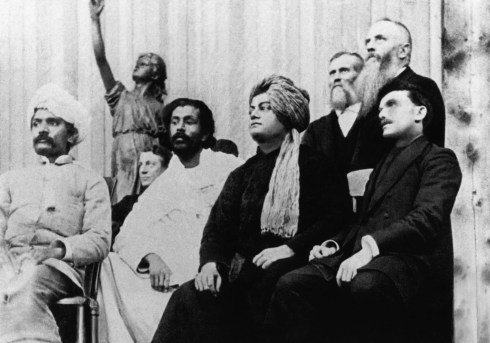“Go from village to village, do good to humanity and to the world at large.” – Swami Vivekananda.
The first memory I have of learning about Swami Vivekananda was a conversation I had as a child with my grandfather, who told me about his famous speech at the Parliament of the World’s Religions in Chicago, 11th September 1893 (now World Brotherhood Day is observed on this day). I remember how I listened intently as my grandfather repeated the salutation, “Sisters and brothers of America!” and how I felt a shiver at the thought of a two-minute standing ovation for Swami Vivekananda as a representative of India. The impact of this speech was a strong base of followers in the USA; his series of lectures shook the world and America.
Who was he?

Swami Vivekananda, also known as Narendranath Datta at birth, or Guru to many, was a Hindu monk and is often described as one of India’s most influential figures of 19th century. Born 12th January, 1863 into an aristocratic Bengali family and hailing from Kolkata, he became one of the most popular nationalists of colonial India. He was a key figure in the introduction of Indian philosophies, including the practice of Yoga, to the western world and is accredited with the popularity that it gained. Swami Vivekananda raised the status of Hinduism as a religion in the Western world and brought attention to the developed civilisation and philosophy of India and the East.

Swami Vivekananda believed in the Absolute as immanent and transcendent; in other words, completely sustaining the spiritual realm of the universe and fabric of our minds. His Hindu philosophy was influenced by his Guru, Guru Ramakrishna Deva, and his teachings were focused on human development. Swami Vivekananda believed that control of the mind, seeing the truth, purity and selflessness strengthened one’s morality, and he spread a gospel of equality and global harmony. The idea of global integration and the role of humanism in his philosophy is a key reason why Swami Vivekananda is still looked up to as a guru and a patriotic saint, and as Ageharanda Bharati, the professor, writer, monk and academic spiritualist credited Swami Vivekananda, “Most Hindus derive their knowledge of Hinduism from Vivekananda, whether directly or indirectly.”
Swami Vivekananda’s impact can be seen in both the Eastern and Western worlds; in the East he is revered still as an influential spiritual leader, and in the West as the pioneer of Vedanta centres where Yoga sutras and transcendental philosophy have been adapted for the Western audience. The fundamentals of spiritual self-improvement have been spread internationally because of the attention Swami Vivekananda brought to the importance of meditation also.
Swami Vivekananda preached for a ‘global village’, before there was anything like the internet to bring about globalisation. He believed and taught that we should all go beyond acceptance of other religions, and respect all religious beliefs, as all humans are working towards the same goal, but on different paths; perhaps something that we should be teaching and believing now more than ever, with terrorism, isolationism and hatred sweeping across the globe. Closing borders or becoming more nationalistic does not, and will not, stop the spread of this. The only way forward is education and acceptance. We all have a lot to learn from Swamiji’s teachings of tolerance, equality and love.
We can also learn from him the importance of education and equality (including gender equality) in strengthening a society, and observe World Brotherhood Day on 11th September. Swami Vivekananda’s dedication to self-enlightenment and love for humanity and the global community continues to inspire the young generation of India, but what can we take from his teachings, 5000 miles away? Well, he preached to his followers that the future of a nation, and the world, lies in the hands of the youth, and we should embrace this responsibility. We should strengthen ourselves and our communities in a time where invisible lines in the sand threaten more than ever, and whether religious or not, we all have a duty to our fellow people. Rather than targeting and criticising those who ignore this in order to fuel hatred, we should be building connections based on truth, and fighting the causes for weaknesses and vulnerabilities in society that lead to xenophobia in the Brexit campaigns, or blatant racism in some aspects of the recent US Presidential Elections. Let’s take the advice left for us so many years ago.
“Condemn none: if you can stretch out a helping hand, do so. If you cannot, fold your hands, bless your brothers, and let them go their own way.” – Swami Vivekananda.

Article on Swami Vivekananda is very well written.If Swamiji’s ideology is circulated throughout the world we could have seen a different universe all together where there is no place of hatred among religions.
LikeLike